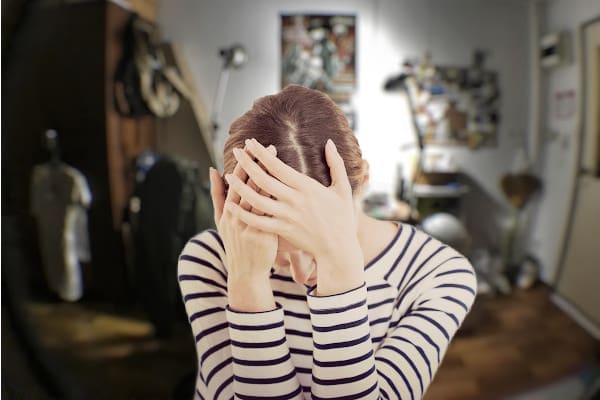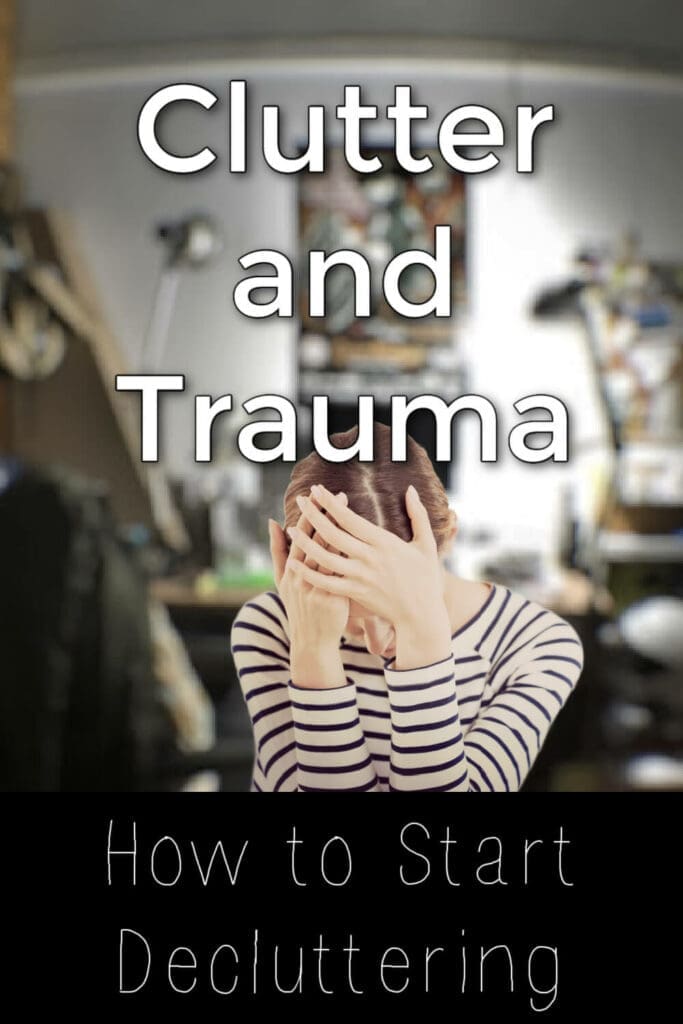Clutter and Trauma: Here’s How to Start Decluttering Through It

Trauma can come in many forms, from accidents to death, abuse, and more, and it can have a lasting effect on our lives, including collecting things that turn into clutter.
Why is clutter a symptom of trauma?
When a person experiences traumatic events, they build protective walls as a coping mechanism to shield themselves from the outside world. Having the stuff around them in their physical space gives them a sense of control that is more important that having a clean house. The more trauma, the more the individual wants to keep things the same and keep more stuff, leading to compulsive hoarding. This trauma response may not be understood by family members.
How are clutter and trauma related?
When people experience trauma, it affects the prefrontal cortex, which is the part of the brain responsible for executive functions like judgment, decision-making, self-control, and planning. It’s easy to understand how someone with trauma can get addicted to many things, including shopping. We might seek that temporary high and want to feel good. With a shopping addition, we are bringing more and more stuff in.
Excessive clutter and disorganization are often symptoms of a bigger health problem. People who have suffered an emotional trauma or a brain injury often find housecleaning overwhelming. Attention deficit disorder, depression, chronic pain and grief can prevent people from getting organized or lead to a buildup of clutter.
What about hoarding?
Hoarding is the most extreme version of holding onto clutter and is recognized in the Diagnostic & Statistical Manual of Mental Disorders (DSM-5). Hoarding disorder is more than just a cluttered home with a neglected to-do list.
Red flags of hoarding may include:
- A home that is not fully functional due to stuff blocking off doorways or whole areas. There may be only pathways in some rooms.
- Accumulating more despite living arrangements (even as a guest in someone else’s home).
- Social isolation and not wanting anyone to see the stuff.
- Difficulty throwing things away.
- Unsanitary living conditions.
- Lack of awareness of their living space being a safety hazard.
What is the root cause of hoarding?
Research says there may not be a single cause for a hoarding problem.
Hoarding may have roots in childhood relating to losing things, not owning things or people not caring for you. (Trauma in childhood can hinder the development of those executive functions mentioned above. Someone who felt abandoned as a child may find comfort in old belongings and keepsakes that won’t leave them.)
People with obsessive-compulsive disorder (OCD) and hoarding tendencies are more likely to have experienced at least one traumatic life event compared to those with just OCD. ~ Psychology Today
However, unlike OCD, hoarding is a progressive disorder that becomes chronic and symptoms continue to increase over time, moving through the five stages of hoarding: minimal clutter, mild clutter, moderate clutter, severe clutter, and extreme clutter.
The initial onset can start as early as 12-15 years old, but tends to become problematic in the time period around the 40s or 50s.
It is all linked.
Why do we hold onto clutter?
Emotional or sentimental attachment. We like to be reminded of good times and important people in their lives. We infuse those feelings into material objects. We like the comfort, safety and sense of well-being we get from our physical stuff.
Fear of the future. This is the dreaded ‘what if I need it?’ ‘What if I get rid of it now and can’t find the replacement if I need it again?’
Obligation. We often feel an obligation to keep something we were given as a gift or inheritance, but in doing so, we forget that we are the only ones who can decide what is worthy of space in our home. That space is ours to use as we like, not for someone else to use as their storage space.
In many ways, we perceive our belongings as extensions of ourselves. In a cluttered space, it’s easy to feel like we also have a cluttered mind, getting pulled in many directions.
How does clutter affect you?
Physiological: Increased stress leads to increased cortisol levels, also known as the stress hormone. This stress response can lead to weight gain, especially in your face and abdomen, and elevated blood pressure.
Psycho-social: There is a link between our homes and self-image. Possession of clutter harms psychological home and perceived well-being. We need a psychological home because that safe refuge offers a place to create our identity separate from society. ~ ScienceDirect
Behavioral: Clutter can lead to frustration, irritation, avoidance, and apathy. It’s uncomfortable to be overwhelmed.
How do you declutter with trauma?
The first step in beginning the process of decluttering and beginning the healing process comes with the decision to change. Change is scary, but we can probably all agree that mental well-being is more important. Whether you opt to use professional help to deal with unresolved trauma or rely on your personal support network, it’s going to bring up intense emotions.
Decluttering can help in recovery from a traumatic experience. Someone who has suffered from narcissistic abuse may find that touching certain possessions triggers the replay of ugly memories of that trauma and agitates that self-doubt and poor state of mind. Do not keep things that make you feel bad.
Start with a small step. Choosing one of your kitchen counters or a bathroom drawer might seem like an insignificant place to begin, but it’s a start and lets you take control of your physical environment.
If you are assisting a hoarder in decluttering, always get the hoarder’s permission to remove items.
Read this article to learn how to start and what steps to take in the decluttering process.
Be aware that decluttering may bring some of your underlying issues up. Emotional cluttering is as much a part of this as the piles of physical things.
Your progress may not be a straight line either. Some days might be an emotional hole, but other days you’ll have a more sympathetic attitude. Be kind to yourself and reach out for help; support groups and counsellors are available.
How good does releasing trauma feel?
As a person releases the trauma, they may experience some or all of these. Some effects may come sooner, and some may be slower.
- Instead of feeling detached from everything, you might feel like your daily life is not getting worse and you feel more emotional.
- You don’t feel sick. There are fewer physical symptoms, like nausea or muscle fatigue.
- Your energy and motivation returns. You find it easier to do self-care and want to do unfinished projects that you’ve been avoiding.
- You feel less pain. Holding trauma in your body can cause pain, like headaches and muscle aches. Your pain levels should decrease as your mental health improves and you heal emotionally.
- You feel less tense and less feelings of anxiety. This can lead to a drop in blood pressure and slower heart rate.
- If you’ve had post-traumatic stress disorder, as you release trauma, there is less reliving the experience and less getting trapped in memories.
- Hobbies and interests return as your focus changes from the trauma to your life.
Always remember decluttering comes before organizing. Your great organizational skills can’t solve the challenge of too much stuff.
Clutter and trauma have a complex relationship, but that doesn’t mean it has to be a permanent relationship. A clutter-free life is possible. For some trauma survivors, the healing journey may involve professional help and it may take a long time, but it will be worth it to get that sense of order and sense of comfort. Your psychological well-being is important.


To Whom It May Concern:. This article is superb❗. A family member hoards but, I’m unable to help the person because they’ve struggled with this for decades ❗. I appreciate all of the on point information and the simplicity of this information ❗
Wow! Great article
Thank you!!! For the first time in my 58 years I feel someone understands me! I feel less alone. For the first time I feel I understand why I live this way. I gave the desire to change just don’t know how. I have recently let 2 friends and my niece in my home after 18 years! I was also forced to allow so repair and delivery people in as well.
Thank you so much for the insight . I sought therapy , but my therapist dismissed my pain that it was too traumatic for me to declutter – it was exhausting. Your article just may be the breakthrough I need
So glad I found your article
I loved this article. Thank you. I am trying to clean & decludder my home. It takes time & motivation. After being depressed for so long & then going through cancer 2 time and a recent brake up in a relationship. I am finally feeling strong enough to tackle this problem in my life.
Thank you very much.
Thank you for this post. I did know some of the trauma I experienced was part of the clutter but this helped me realize I have more emotional work along with decluttering.
Thank you for this article, I’ve been aware of the whole situation for years, but I can’t get out if it by myself.
If there is any professional you can suggest I would be very grateful, it isn’t easy to find mental health professionals who specialize in this kind of disorder, and those who don’t can’t really help and only foster frustration.
Support groups would also be highly appreciated.
Thank you!